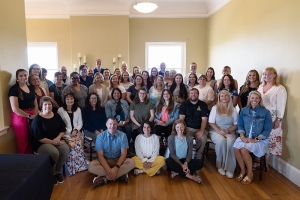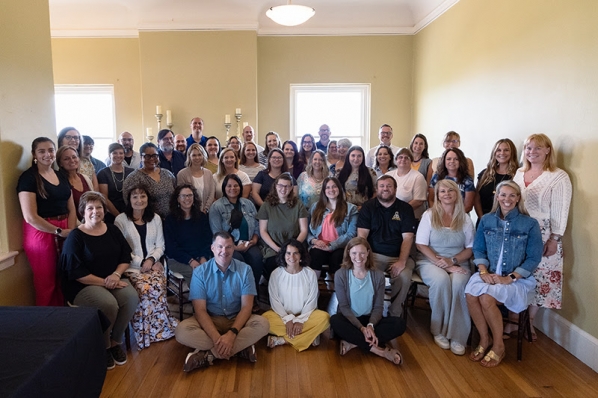Empowering Teacher Learning (ETL) focuses on shifting the way teachers engage with professional learning to maintain licensure in rural, western North Carolina, from district-directed and time-based to teacher-directed and competency-based. The project is measuring the impacts of a 3-year intervention that uses a Teacher-Directed Professional Learning (TDPL) model on teachers and students in rural, high-need schools. This model acknowledges teachers as professionals who are capable of directing their own professional learning needs and is grounded in the idea that, when teachers are given choice and support in their professional learning, they will select opportunities for growth that meet the needs of themselves, their students, and their communities. As teachers earn micro-credentials, they are recognized (through earning continuing education units or CEUs) and compensated (through stipend payments) for their time, effort, and accomplishments. The ETL Project’s TDPL model scaffolds the self-directed learning process for teachers through four main components:
- Needs Assessment: Teachers reflect on and assess their own professional learning needs
- Self-Directed Learning Plan: Teachers use their personalized data to set goals for their professional learning for the upcoming school year
- Self-Directed Learning Journey: Teachers select online, competency-based micro-credentials to accomplish their goals
- Ongoing Collaborative Reflection: ETL Navigators (Micro-credential Coaches) provide one-on-one support to teachers, helping them to reflect on their practice and facilitating collaboration amongst teacher participants
Though the project was well-received by many districts, ETL encountered challenges with recruitment due COVID-19 and schools' and districts' capacities to take on “one more thing.” To account for a longer recruitment period, the ETL team designed and inserted a pilot study during the first year of the grant that provided a wealth of information for implementation in the following year. The project is currently finishing up the second year of implementation with more than 300 teachers across 29 schools and has awarded more than $100,000 in teacher stipends as compensation for their time, effort, and professional learning accomplishments.
The most recent challenge to the ETL Project was unrelated to recruitment or COVID-19 and came when the State Legislature passed a law that limited student data collection in schools. This inhibited the grant team’s ability to collect classroom observational data using video and student SEL survey data, both key outcome metrics for the project. The ETL Team was able to pivot quickly to adopt a new process for collecting classroom observation data and to create a system for processing approximately 10,000 parental consent forms using a scanning software so that overall outcome measures for the project will not be as heavily impacted as had originally feared. Though challenging at times, this experience helped the ETL team reflect on current practices, collaborate across the implementation and research teams, and find innovative solutions that served to support and strengthen the work of the grant.
Despite challenges with data collection, the teacher participants in the second year of the project are thriving. Teachers have remarked on their increased sense of agency due to choosing their own professional learning topics. They often express how useful it is to learn about what interests them so they may address the needs of their unique learning environments. Many teachers collaborate on micro-credentials through working with their PLC or Navigator to find resources, develop lessons, and reflect upon their selected strategy. In their own words, participants said:
“Participating with the ETL project has been very worthwhile. I appreciate the self-directed learning aspect so much. Being able to choose the microcredentials that best relate to goals that I had set for myself professionally makes so much sense! It was helpful to also have a navigator assigned that could help us troubleshoot any issues that we were having. I love that I received valid information that was pertinent to what I needed/wanted to know rather than just "checking a box" to say that I had had PD this year.”
- Teacher Participant
“I really enjoyed this. I got to select what I wanted to work on based on the needs of my own students doing projects that we have been working on, and I think the kids got a lot out of it. It was much better than the typical PD where you think-- how can I apply this in my own classroom? The question was inherently answered as I was doing the microcredential.”
- Teacher Participant
The ETL team has made an effort to partner with school administrators this year to strengthen the program within school culture. Teachers are highlighted for their accomplishments in the ETL quarterly newsletter that is later shared with school administrators. Many teachers reported that, because they had a competency-based credential, they scored higher on NC Educator Effectiveness System observations because they were able to provide their administrator with artifacts to support their competency in their professional standards. Teachers and administrators from their schools will join the ETL Team on campus for summer convening to celebrate their accomplishments and make plans for their final year of TDPL.
The biggest lesson the ETL Team has learned has been around resilience and continuing their work with teachers despite challenges in other areas of the project. Knowing that the work of this grant is helping to shift the landscape of teacher professional learning in a way that is meaningful to teachers makes the work fulfilling and worth every bit of hard work.

